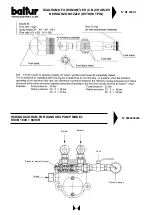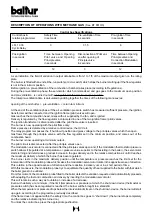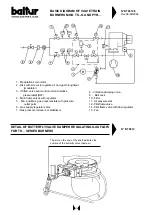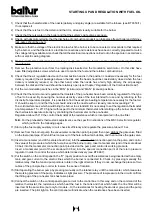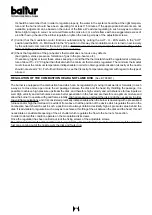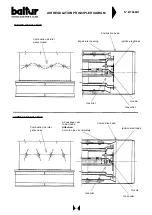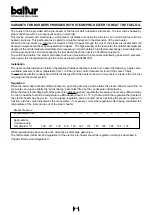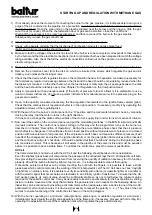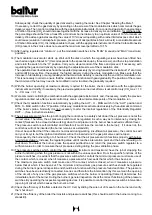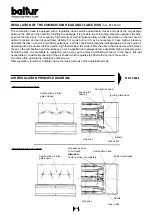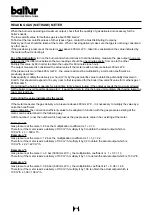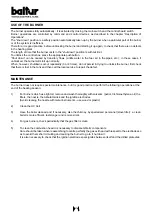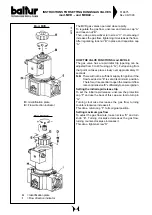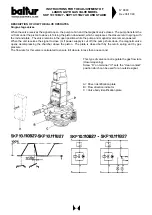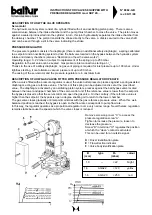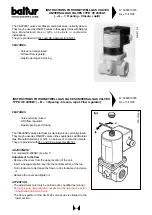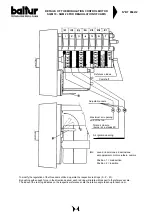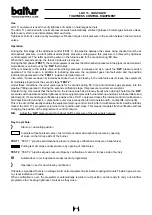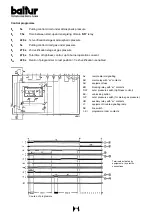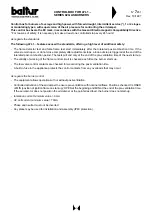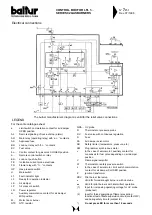
23
1) If not already done at the moment of connecting the burner to the gas pipeline, it is indispensable to carry out a
purge of the air contained in the pipeline. As a precaution, special care should be taken and doors and windows
should be opened. Open the pipe union on the pipeline situated near the burner and then open a little the gas
cut-off cock (or cocks). When the characteristic odour of gas can be smelled, close the cut-off cock.
Wait until the gas present in the room has dispersed, and then reconnect the burner to the gas pipeline.
Subsequently, re-open the gas cut-off cock.
2) Check that there is water in the boiler and that the system’s gas valves are open.
3) Check, with absolute certainty that the discharge of combustion products can take place freely
(boiler and chimney lock-gates should be open).
4) Make sure that the voltage of the electric line to which the burner is to be connected, corresponds to that required
by the burner and that the electrical connections (motor or principle line) have been prepared to match the voltage
rating available. Also check that all the electrical connections carried out on the spot are in accordance with our
electric wiring diagram.
5) Make sure that the combustion head is long enough to enter the furnace to the extent specified by the boiler manufacturer.
6) Remove the protective cover from the disk on which are inserted the screws which regulate the gas and air
delivery, and unloosen the locking screws.
7) Check that the device which regulates the air on the combustion head is in theposition considered necessary for
the fuel delivery required (air passage between the disk and the head should be considerably reduced when the
fuel delivery is reduced; on the other hand, when the fuel delivery is fairly high, the air passage between the disk
and the head should be relatively open). See Chapter “Air Regulation on the Combustion Head”.
8) Apply a manometer with an adequate scale (if the entity of pressure forecast allows it, it is preferable to use a
column of water instrument, do not use a pointer instrument for moderate pressure) to the pressure plug on the
gas pressure switch.
9) Open, to the quantity considered necessary, the flow regulator incorporated in the ignition flame valve(s) (pilot).
Check that the combustion air regulation shutter is in the right position; if necessary, modify it by operating the
adjustable screws of the regulating disk.
10) With the switch on the burner’s control panel in the “O” position and the main switch inserted check, by manually
closing the relay, that the motor rotates in the right direction.
If it does not, exchange the places of two cables of the motor’s supply line in order to invert its sense of rotation.
11) Now insert the switch on the commend panel and put the modulating switches in the MIN (minimum) and MAN
(manual) positions. The control box receives voltage in this way and the programmer turns on the burner as
described in Chapter “Description of Operations”. During the pre-ventilation phase check that the air pressure
switch effects a changeover (it should pass from a closed position without measurement of pressure to a closed
position with measurement of air pressure). If the air pressure switch does not measure sufficient pressure (it will
not effect the changeover) and neither the ignition transformer nor the gas ignition flame valves will be inserted
and the control box will go to “shut down”. It should be pointed out that “shut downs” during the first ignition phase
are considered normal. This is because air still exists in the pipeline of the valve incline and must be expelled
before it is possible to have a stable flame. To unblock the control box, press the relevant pushbutton.
UV Cell
The flame detection is carried out with the UV Cell and the following should be taken into consideration.
Even the slightest greasiness will compromise the passage of the ultraviolet rays the UV photoelectric cell bulb,
thus preventing the sensitive internal element from receiving the quantity of radiation necessary for it to function
properly. Should the bulb be fouled by light oil, fuel oil, etc., it is indispensable to clean it thoroughly.
It should be pointed out that even by simply touching the bulb with the fingers, it is possible to leave a slight
greasiness which could compromise the working of the UV photoelectric cell. The UV Cell does not “see” daylight
or light from an ordinary lamp. It is possible to verify its sensibility with a flame (or cigarette lighter or a candle) or
with the electric spark that occurs between electrodes in an ordinary ignition transformer. To ensure that the UV
Cell works properly, its current value should be sufficiently stable so as not to fall below the minimum value
required for the specific control box. It may be necessary to search experimentally for the best position by sliding
(axial or rotation movement) the body that contains the photoelectric cell in respect to the fastening clamp. An
inspection can be carried out by inserting a microammeter, with an adequate scale, in series to one of the two UV
photoelectric cell connection wires. It is obviously necessary to respect the polarity ( + e - ). The value of the cell
current to ensure functioning of the control box is shown on the wiring diagram.
12) With the burner operating at a minimum (principle flame valves open, modulation regulator at a minimum),
immediately check visually the entity and appearance of the flame and, if necessary, proceed with correcting it by
operating the adjustable screws of the modulation disk which regulates the gas and air delivery.
STARTING UP AND REGULATION WITH METHANE GAS
Summary of Contents for TS 0 GN
Page 2: ......
Page 47: ......
Page 48: ......
Page 49: ......
Page 50: ......
Page 51: ......
Page 52: ......
Page 53: ......
Page 54: ......
Page 55: ......
Page 56: ......
Page 57: ......
Page 58: ......
Page 59: ......
Page 60: ......
Page 61: ......
Page 62: ......
Page 63: ......
Page 64: ......
Page 65: ......
Page 66: ......
Page 67: ......
Page 68: ......
Page 69: ......
Page 70: ......
Page 71: ......
Page 72: ......
Page 73: ......
Page 74: ......
Page 75: ......
Page 76: ......
Page 77: ......
Page 78: ......
Page 79: ......
Page 80: ......
Page 81: ......
Page 82: ......
Page 83: ......
Page 84: ......
Page 85: ......
Page 86: ......
Page 87: ......
Page 88: ......
Page 89: ......
Page 90: ......
Page 91: ......
Page 92: ......
Page 93: ......
Page 94: ......
Page 95: ......







